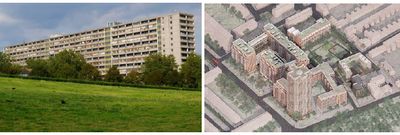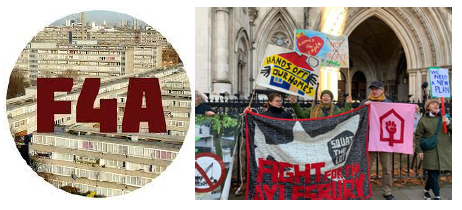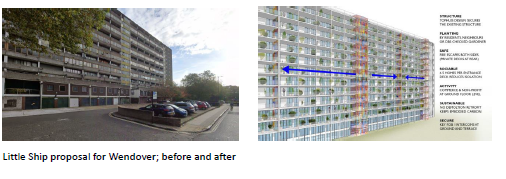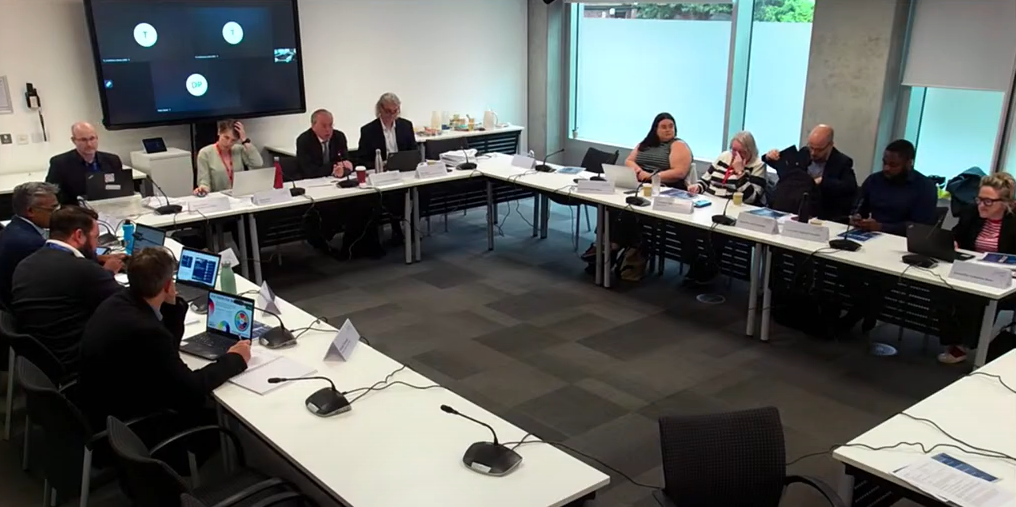
Southwark Council’s planning committee finally passed Notting Hill Genesis’ troubled planning application for the latest phase of the Aylesbury regeneration by 6 votes to one, at its 4 June meeting. The resolution to approve will now have to be finalised by a completed legal s106 agreement, between Southwark and NHG [^1].
The Phase 2B application was first considered in January 2023, when the committee resolved to approve, but a subsequent successful legal challenge by local resident Aysen Dennis prevented the grant of a full permission. Phase 2B covers about half of the Aylesbury’s largest block, Wendover, and adjacent maisonette blocks, Padbury, Ravenstone and Winslow.
The committee considered an amended version of the scheme, which increased the total number of homes by twenty-six units, to 640, and added one-storey to four buildings, to a maximum height of 26 storeys. NHG stated that these changes were necessary because of new building safety requirements, including a second staircase in tall buildings. The application remained a 'standalone' or 'drop-in' application, outside the Outline Planning Permission, which NHG already holds for the all the remaining phases of the regeneration
More or less social rented housing?
Phase 2B will have 50% affordable housing, three-quarters as social rent, so will deliver 173 social rent, 89 intermediate and 378 private homes. Despite this, there will still be a net loss of 143 social rented units, measured against the 316 council houses that are to be demolished [^2].
The committee was told that while there was a net loss of social rent units, there was an increase of social rented accommodation, when measured by habitable room and floorspace and that this conformed to the London Mayor’s requirement that there be no shortfall in social rented housing.
This was challenged by objectors of Fight4Aylesbury. The Southwark Law Centre also objected, saying that the size of some of the existing dwellings and the average of habitable rooms per unit had been underestimated. SLC also queried the omission from existing floorspace of the homes of Foxcote, a maisonette block that was demolished in 2016. In response the Council reduced its estimate of the 'uplift' of new affordable floorspace, but maintained that it still met the Mayor's requirements. The Council also believed that omitting Foxcote from the calculations was correct, because it was demolished before the current application was submitted [^3].

More or less sustainable?
Fight4Aylesbury objectors challenged the sustainability of the proposed scheme. A request to make a presentation of an alternative refurbishment scheme, devised by the Community Interest Company, Little Ships was refused, on the grounds that the committee can only consider schemes as presented by the applicant. However, the chair, Cllr Richard Livingstone, did allow some discussion of the relative merits of demolition verses refurbishment, which included committee members questioning both objectors and NHG on the issue. Amongst other things, objectors pointed to the carbon emissions entailed in demolishing the estate’s large concrete panelled buildings, while NHG contended that emissions will still be reduced to levels beyond that required by building regulations.
Why so little family housing?
Objectors and the SLC also drew the committee's attention to the low level of family housing, with just 102 three+ bed units and falling short of the Councils requirements for two-bed plus, three-bed plus and five-bed plus (four-bed plus was met). The committee report noted this, but considered it acceptable because all the four and five bed homes would be for social rented housing. The report also approved of the higher number of one and two bed free-market homes, because these improved the viability of the scheme [^4].
The SLC objection rejected these arguments, pointing out that the Aylesbury had been envisaged as a family-oriented regeneration and that the Southwark Plan 2022 had been drafted 'to ensure a particularly high amount of family homes on the Aylesbury estate'; further, the relevant policy was not subject to viability and therefore failing to provide the required family housing was a severe breach of the Southwark Plan.

Ward councillors decline to support NHG application
Cllr Ketzia Harper, representing the local ward councillors, was fiercely critical of NHG and the slow progress of the regeneration under their stewardship. She related to the committee details of the Aylesbury's deteriorating physical condition. and the poor living conditions that this was creating for the residents still on the estate. She forcefully rebutted NHG's claim that it had delivered 1,000 new homes to date, pointing out that the stalled First Development Site had to be facilitated by the Council buying over half the new stock, and reiterated concerns about the height of the development and the replacement of the social rented housing.
Cllr Harper also spoke of worries about the knock-on effect of continuing with the 'drop-in' application for Phase 2B, outside of the Outline Planning Permission; she noted that this had already occasioned a successful legal challenge and was concerned that this may happen again. She noted that the new Bagshot St park was a positive, but when asked by the committee whether she was for or against the application, she said she could not answer and that her role was to give evidence for the committee to decide. Cllr Harper added she wished to see the relationship between Southwark Council and NHG resolved.
Legal advice reassures committee
The question around the 'drop-in' nature of the application was picked up by the Council's legal officer. She advised that it was possible for there to be more than one planning permission for a given site and that this was only a problem if one made the other impossible to implement. This was not the case for Phase 2B and the Outline Planning Permission would still remain valid, if the committee granted permission for the 'drop-in' application.

The Committee's decision
The committee decided by 6 votes to one to approve the application. Members noted the issues and objections that had been raised, but were persuaded to approve by the good design of the proposal and its contribution to wider affordable housing delivery. The committee also thought that a new build would be more sustainable than a refurbishment; it was also reassured by the legal advice that the approved application would not compromise the Outline Planning Permission, covering the remaining phases. The one dissenting councillor, Cllr Reginald Poopala, broadly agreed with the objectors' points, noting in particular the shortfall in family housing and so voted against approval.
The chair, Cllr Livingstone, noted that while the application was not perfect, the London Mayor supported it. He said that he had been impressed by all the presentations (particularly that of the ward councillors) and added that retrofitting buildings should be further explored, while taking into consideration both costs and the regeneration's object of delivering 2,249 social rented units.
What we say.....
It was not surprising that the committee approved this application, having already done so once. However, it was entirely uncurious as to why they had to consider the application a second time, having already approved it in January 2023. A question it could have asked, but did not, is why the entire phase ended up as the subject of a High Court case, which Southwark and NHG lost, at no doubt great expense to both?
A second unanswered question is why it was thought necessary to change the description of the Outline Planning Permission the last time this application was considered, with what proved to be an unlawful amendment, but now the OPP can be left untouched? The legal position now seems to be that no such change is necessary for the OPP to retain its validity. The fact that the 'drop-in' application has been amended since January 2023 may be true, but is irrelevant to both these questions.
More importantly, while the legal advice given to the committee is that the OPP remains valid, this is no guarantee in itself that the remaining phases will be built according to the OPP. All the reasons that NHG have given for abandoning the OPP for Phase 2B apply equally, if not more so, to Phase 2C, 3 and 4 and leaves the plans for these later phases entirely uncertain.
This, taken together NHG's track record and local councillors' evident frustration with progress, begins to make a case for now ending NHG's stewardship of the regeneration and looking much harder at the refurbishment alternative presented by Fight4Aylesbury. While the committee voted through this application, its willingness to at least listen to this alternative is encouraging and should be pursued.
Footnotes:
[^1] The full application, including all planning documents, can be found via Southwark Council's planning register, clicking 'Use the planning register' button and entering ref 22/AP/2226 into the search box.
[^2] The SLC objection letter can be found in planning application 22/AP/2226, under the documents tab, labelled 'Objection', dated 20 May 2025.
[^3] There are 373 existing homes; the committee report gives two different figures for the number of existing social rent units 327 (para 35) and 316 (para 101). The 316 figure has been used to calculate the loss of social rent, but whichever figure is used, the remaining homes will be leasehold.
[^4] The number of family homes break down into - 42 three-bed (14 free-market; 28 social rent); 49 four-bed (all social rent); 11 five-bed (all social rent). Eighty-eight of the homes will be social rent, fourteen free-market, none will be intermediate housing.
Our previous blogposts about the Aylesbury estate
Aylesbury Phase 2B - profitable, but not viable
Aylesbury regeneration plot fails to deliver affordable housing and new houses
Aylesbury Phase 2B - Notting Hill Genesis try again
What next after High Court overturns Aylesbury planning decision?
Aylesbury estate legal battle goes to the High Court
Aylesbury Update: cost of leaseholder buy-outs leaps
Southwark rips up Aylesbury Area Action Plan
Aylesbury estate regeneration to have new council homes
Aylesbury CPO- what's really happened
Aylesbury CPO appeal - a grounded defence
Aylesbury: Southwark finally granted leave to appeal CPO decision.
Aylesbury Crowdfunding kicks off to successful start
Victory for Aylesbury Leaseholders
Aylesbury CPO Inquiry - Extra Time
Aylesbury CPO Inquiry - Into the Lion's Den
Aylesbury Applications Approved
Aylesbury redevelopment - decision day
Aylesbury estate planning applications - 934 social rented homes to be lost
Aylesbury estate - 42 more residents face Compulsory Purchase
Aylesbury leaseholder fights 'incestuous' valuations